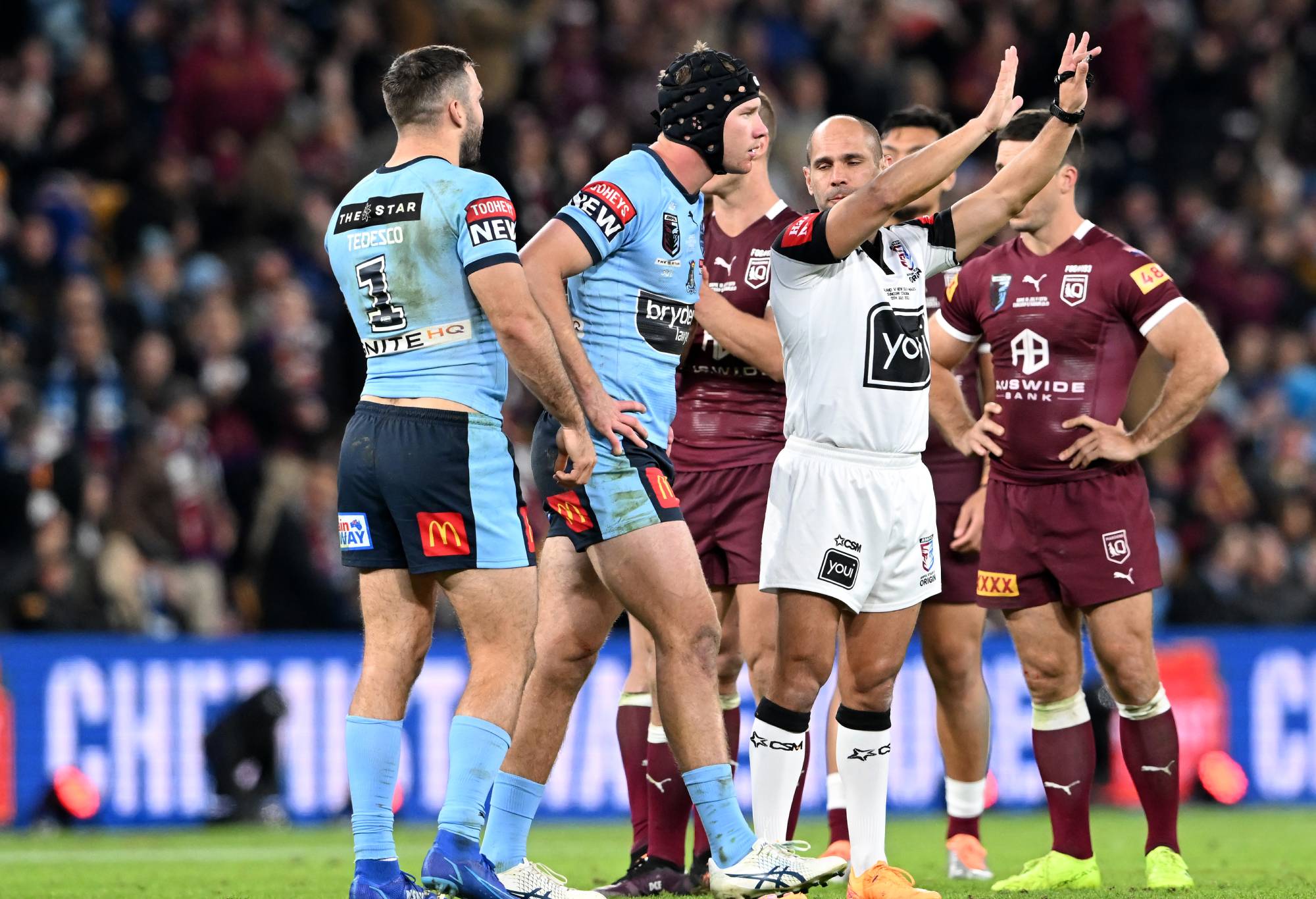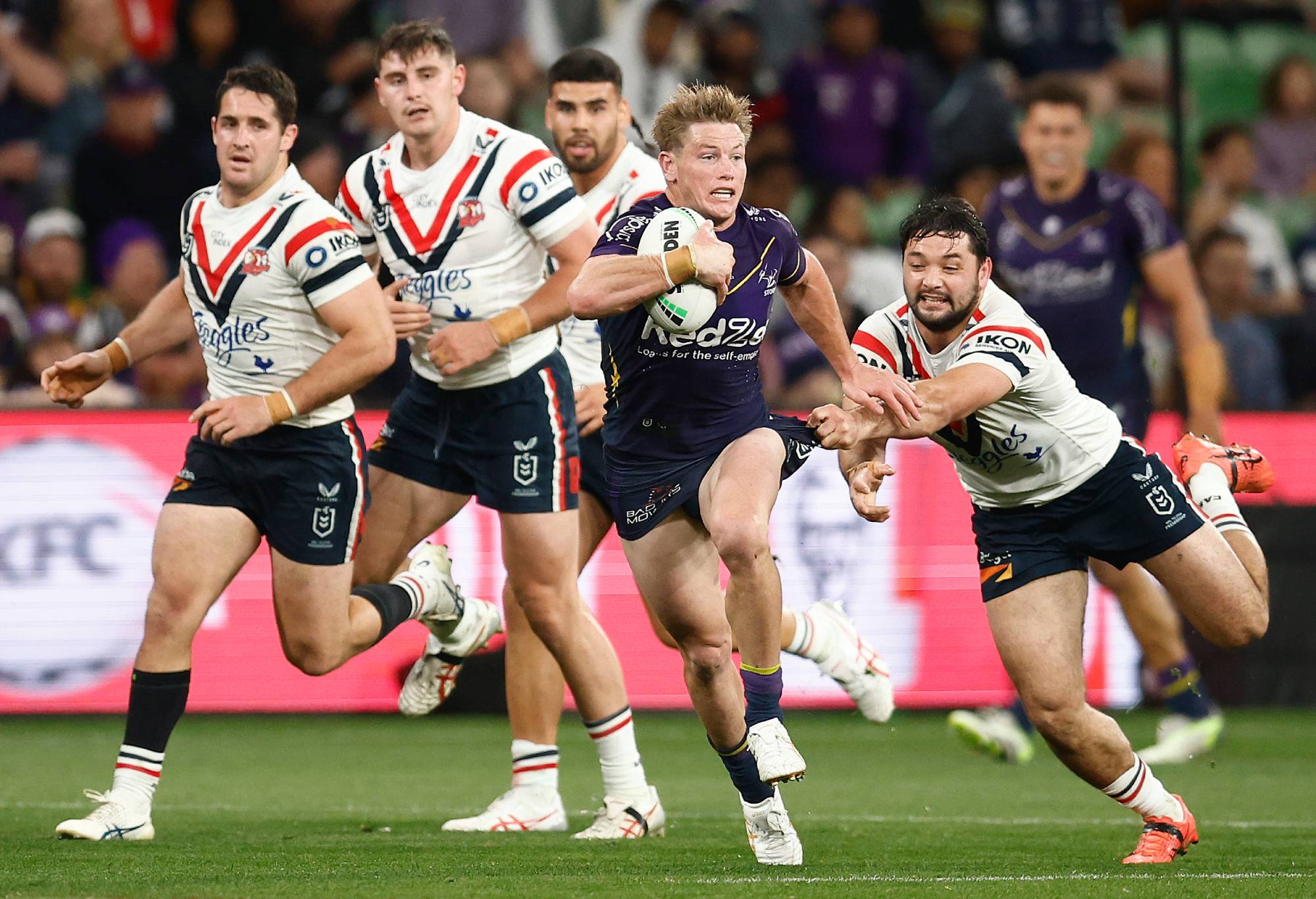There are three topics you should never bring up in polite company unless you want to start a free-for-all – religion, politics and the state of NRL refereeing.
This won’t sit well with many critics but the standard of refereeing has never been better.
Particularly if you look through the lens of how the modern-day refs have to officiate a match while negotiating a minefield of recent rule changes and technical interpretations with cameras covering every angle, it’s surprising that they don’t make more mistakes.
Ashley Klein came up with a couple of howlers last Friday at AAMI Park which should bring his status as the NRL’s top-rated whistleblower under serious question.
They were the kind of clangers that can happen from time to time when you have humans making decisions, just like the players who frequently take wrong options at a crucial stage of the match that can prove decisive.

(Photo by Bradley Kanaris/Getty Images)
And for all those old league fans with rose-coloured glasses who pine for yesteryear, such errors were also made by Bill Harrigan, Steven Clark Mick Stone, Greg Hartley or any other old whistleblower you care to mention from the “good old days”, including Graham Annesley, who now oversees the NRL’s football operations and is ultimately responsible for the standard of officiating.
Two decades ago the NRL only had three only professional refs – Harrigan, Clark and Tim Mander – before a few years later the move to a full-time squad meant all the whistleblowers could ditch their day job.
They have definitely become fitter than ever before while also benefiting from the ability to receive extensive feedback on their performances on a weekly basis and get genuine coaching on areas to improve.
Grant Atkins was dropped from first grade last month when he miscalculated the tackle count on a zero tackle set and Newcastle scored a try against South Sydney on what was their eighth straight attacking play.
To be honest, it’s surprising this doesn’t happen more. Cricket umpires struggle to successfully count to six on a regular basis, often when they have to revise their tally midway through an over for a no-ball or wide.
Try keeping an accurate count while running up and down a football field while also ensuring the defensive team is onside and the myriad other split-second calls as NRL referee is called on to make over the course of two physically demanding 40-minute examinations while spectators rain down abuse from the outer.
Fortunately for Klein, his two dud calls did not decide the final result more from good luck than management.
The Harry Grant knock-on error cost the Roosters when Melbourne scored a try up the other end, Trent Robinson wisely pointed to the fact that his team should have defended the subsequent passage of play better and Klein’s proverbial bacon was saved when the wrong call late in the game to not penalise a Sam Walker high shot was erased by the Storm’s match-winning try moments later.

Harry Grant. (Photo by Daniel Pockett/Getty Images)
Annesley, on Monday at his weekly media briefing, could not guarantee whether Klein, who controlled last year’s Grand Final and the past six State of Origin matches, would remain one of the two refs chosen for the preliminary finals this weekend.
Klein is reportedly facing the chop, according to NewsCorp, with Atkins replacing him when the appointments are announced on Tuesday afternoon. That would give Adam Gee, who controlled last weekend’s other semi-final, the inside running to make his Grand Final debut.
“That decision hasn’t been made yet. We’ve spent this morning reviewing both games, going through incidents. We’ll review all of the information that we have on match officials,” Annesley said.
“We look at the statistics around all their matches, in terms of enforcement of certain parts of the game. We will then make a decision we think is appropriate, given the significance of the games and making sure that we’ve got referees on the field that are the best available officials to perform in those matches.
“He wouldn’t be human if he didn’t have something in the back of his mind about an error he knew he had made but referees are trained over a long period of time to just put that behind them and keep refereeing the game.
“If they start thinking about things that have happened previously they’re not concentrating on what’s happening in front of them.”
As far as calls for a captain’s challenge to be allowed even when there’s not a stoppage or whether the bunker should intervene in an incident like the Grant knock-on, Annesley gave those ideas short shrift.
“Once the moment is lost, it is gone. The bunker is not allowed to intervene in general play. I know there are a lot of people who think the bunker is tipping the referee all the time and that is not the case,” he said.
“They (bunker officials) are simply monitoring the play, waiting to be asked to intervene or to look for foul play the referee had missed. That’s the only situation where the bunker can intervene without being called into the game.”
As to why they didn’t intervene when Klein refused to penalise Walker for tackling Grant high, Annesley said the bunker has only stepped in this season when an offence was deemed worthy of a report or sterner action.
The change in interpretations was done in the off-season to discourage players from staying down when they copped incidental high contact.
Grant took his time before getting to his feet to play the ball and remonstrated with Klein after the ref told him to get on with the game.
“It was almost becoming farcical with players staying down (last year) at the slightest contact with the head,” Annesley said.
“Even though a penalty wasn’t awarded, the bunker couldn’t say to the referee under our current rules that’s a high tackle and should be penalised because that would have been contrary to what we’ve done all season.
“If they had reached the conclusion that it was a reportable offence they could have got involved.”
Now let’s move onto the easier topics of religion and politics …






























































































